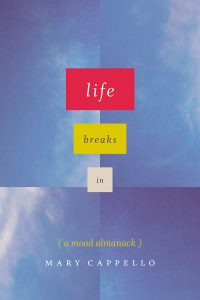Mary Cappello at Essay Daily

Below follows an excerpt from a recent interview with Mary Cappello at Essay Daily about Life Breaks In, her exegesis (or, biography) (or, as the subtitle states, “almanack”) of mood, which captures the spirit of associative thinking and lyrical fluency that propels the book.
***
Q: How much of mood is like trying to describe the uncanny—or—how important is the uncanny to writing nonfiction?
A: I hope you don’t mind if I refer to an interview I carried out around my previous book, Swallow, in which I discuss the importance of the uncanny to my work and to nonfiction generally: http://www.propellermag.com/Fall2011/Cappellofall11.html
I think the uncanny is at the heart of literary nonfiction. The places where the real slip-slides with something unrecognizable, where the familiar and the strange switch places. Cognitive dissonance. Home not home. The pleasure and necessity of altered states.
At the risk of sounding psycho, I’d like to use the occasion of your question to try to put into words an “episode” I experienced in these days following the 2016 presidential election for the way it speaks to the alteration of the “real” as some of us know it. What Freud says about the uncanny is that, when we’re in its midst, there’s a combination admission and refusal of a shock of recognition whereby what I once believed, but later was required to deny, is now confirmed. I think we are all currently experiencing aspects of this dynamic in different combinations and intensities, and I think it is extremely important that we not give in to delusional forms of acceptance that would underplay the threat to fundamental human rights by this new regime.
My “episode” unfolded as follows: Autumn in New England this year has been particularly splendid, but of course it feels quite out of sync with the darkness that the new presidency augurs. At some point this week, it was warm enough to bicycle to an appointment, and I remember noticing a sudden, beautiful and forceful swoop and swirl of leaves, the feeling of my bike intersecting that movement, one vector in a complex and jubilant physics, a pure moment of being, my riding just then and there.
En route to the university where I teach, a day or two later, by car, the cloud cover was phenomenal, and autumnal colors on the back roads I travel were silver-tinted and surreal. I had been trying to continue to value what I consider the heart of my own aesthetic—which is something like a desire to devote myself to life’s minute particulars with all the love I can muster. An abiding interest in beauty, especially of the strange or disruptive variety.
Just as I was trying to attach to this thought, it was as though a slide had been slipped into the scene that I was viewing, altering the experience entirely, and with it, my charge as a writer. For an instant the entire landscape, I could say, the entire light-scape was suspended, and an irreal mode took over that I could only liken to “the fascist sublime.” In other words, it was as though, for a split second, the “beauty” I’d perceived just prior was now suspect to me: I wondered if it mightn’t be a scene manufactured by the same forces that elected Trump into the presidency.
Fascism, as we know, has its own aesthetic: characterized by austerity and flatness, unreflective surfaces, “towering” heights. I don’t think what I am describing is paranoia.
I began to wonder if there was a difference worth contemplating between the sensibility I believe I have cultivated for at least two decades, and a new filter or lens by which I might be required to perceive the world. I’m wondering how my aesthetic will have to shift—what our charge as writers will be—when the places we usually find beauty are usurped. But then, was the landscape ever mine to behold? Of course not—I mean, unlike the guy who is being charged with leading the country, I admit to the fact of the existence of global warming.
Does this make sense? It wasn’t that my cognition had changed, but that the “scene” had—and I felt I must be more vigilant around seductive surfaces, or careful not to confuse beauty (with a capital B) with the charade that we are being asked to entertain, accept, and watch. It’s a moment that demands our utmost considered pause. Of course I also believe that contemplation can be a form of activism (which doesn’t mean I’m not taking to the streets!).
To read more about Life Breaks In, click here.